The 54th Climate Reality Leadership Training, hosted by The Climate Reality Project, took place from November 13 to 15 in Accra, Ghana. This global event aimed to equip advocates with the knowledge and tools needed to drive effective climate solutions. In attendance was Ikur Edmund Hellandendu from Adamawa, Nigeria, whose background in environmental sciences and upbringing in a family valuing sustainable farming fueled his interest in conservation.
Ikur entered the training with a dual purpose – to gain knowledge and to connect with climate leaders worldwide. Expressing his expectations, he noted, “I had it in mind to make connections and network with climate leaders from around the world to chart a new course to mitigate the manifesting effect of the climate crisis.”
The all-time favourite moment for Ikur was learning directly from Former US Vice President Al Gore. President Gore’s insights on the scientific impact and potential solutions deeply resonated with him. Ikur raised an important question about practical solutions to unpredictable rainfall and drought, drawing from his experiences in the North. President Gore emphasized the need for global leaders to address the truth about climate change, allocate more funds for mitigation, and transition away from oil exploration to cleaner energy sources.
Ikur envisions West Africa as a potential leader in sustainable development. He emphasized the importance of investing in people, communities, and the environment. “We need more proactive solutions and measures,” he explained, advocating for collective efforts and increased financial investments.
Post-training, Ikur’s focus is clear – take action. Inspired by Vice President Gore’s advice, he plans to engage with local leaders and communities in Adamawa, addressing the low agricultural yields resulting from climate change. His strategy involves organizing community campaigns, seminars, and school outreach programs to raise awareness and implement practical solutions.
Ikur’s call to action is a powerful plea for collective responsibility. He emphasizes that climate change is a reality in Nigeria, affecting regions from the north to the south with desert storms, rising temperatures, and erosion. Ikur urges proactive measures, including stopping harmful practices like deforestation and indiscriminate waste disposal. He calls on enlightened individuals to educate others, volunteer with organizations involved in climate action, and emphasizes that everyone must play a role in tackling this urgent global challenge.

